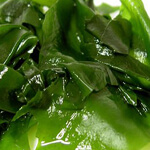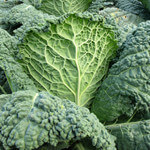 Wakame is an edible brown seaweed that is native to the cold and temperate coastal areas of Korea, China, and Japan. It has a delicate flavor and a slippery texture. Dried or salted wakame is often incorporated into a variety of East Asian dishes, including miyeok guk, miso soup, and tofu-based salads.
Wakame is an edible brown seaweed that is native to the cold and temperate coastal areas of Korea, China, and Japan. It has a delicate flavor and a slippery texture. Dried or salted wakame is often incorporated into a variety of East Asian dishes, including miyeok guk, miso soup, and tofu-based salads.
Although wakame’s popularity remains confined to East Asia, many natural food stores in the West have started stocking it as a supplement because of its nutritiousness.
List of Health Benefits
Fat burning properties – Researchers at Hokkaido University found that fucoxanthin, a compound found in wakame, could reduce the accumulation of fat in mice. This compound, which gives wakame its characteristic brown color and helps the seaweed to photosynthesize, seems to stimulate the liver into producing an omega-3 fatty acid called DHA, which helps to lower the “bad” LDL cholesterol responsible for obesity and heart disease.
Additional weight loss properties – There are other reasons why wakame is a good weight loss food aside from its fucoxanthin content. One hundred grams of raw wakame, for instance, provide us with only 45 calories, 9 grams of cholesterol, and a single gram of fat. Sadly, wakame contains almost no dietary fiber, which is unusual for a seaweed (arame, bladderwrack, and agar, for example, are comprised of between 20 and 40 percent fiber).
Rich in iodine – Due to ongoing soil depletion, sea vegetables have long overtaken land vegetables in the iodine department, and wakame is no exception. One hundred grams of it contains approximately 790 micrograms of this essential trace mineral, which regulates the thyroid (which, in turn, regulates the metabolism). Moreover, a 2003 study in Breast Cancer Research confirmed that iodine can inhibit, and even eliminate, mammary tumors. This fact might help to explain why breast cancer is rare in men and women in Japan, where seaweed is regularly incorporated into meals.
Eicosapentaenoic acid – Wakame is one of the richest plant-based sources of eicosapentaenoic acid in the world. Between one and two tablespoons of wakame provides us with between 15 and 30 milligrams of this important omega-3 fatty acid, which is normally found in fish and can guard us from depression, anxiety, age-related memory issues, and even rheumatoid arthritis.
Calcium and magnesium – Two of the many minerals found in wakame include calcium (15 milligrams per 100 grams, or 15 percent of our recommended daily intake) and magnesium (107 milligrams per 100 grams, or 25 percent of our RDI). Calcium is, of course, needed for strong teeth and bones, while magnesium helps our body to absorb the calcium. Consequently, wakame is an excellent food to eat for preventing osteoporosis and other bone diseases.
Protein and iron – Sea vegetables are some of the best, if not the best, plant-based sources of protein and iron. One hundred grams of wakame provides us with approximately 3 milligrams of protein (6 percent of our RDI) and 2.2 milligrams of iron (12 percent of our RDI).
100 grams of wakame also provide us with varying quantities of manganese, selenium, copper, zinc, potassium, and phosphorous, as well as moderate amounts of vitamins A, C, E, K, and the B-vitamins (including folate, niacin, thiamin, and pantothenic acid).






